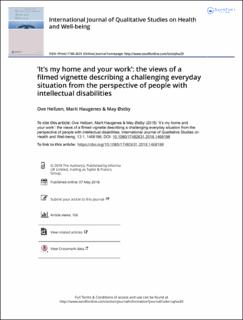| dc.contributor.author | Hellzèn, Per Ove | |
| dc.contributor.author | Haugenes, Marit | |
| dc.contributor.author | Østby, May | |
| dc.date.accessioned | 2022-11-03T12:16:58Z | |
| dc.date.available | 2022-11-03T12:16:58Z | |
| dc.date.created | 2018-05-09T11:16:51Z | |
| dc.date.issued | 2018 | |
| dc.identifier.citation | International Journal of Qualitative Studies on Health and Well-being. 2018, 13 (1), 1-9. | en_US |
| dc.identifier.issn | 1748-2623 | |
| dc.identifier.uri | https://hdl.handle.net/11250/3029884 | |
| dc.description.abstract | Purpose: Examining everyday challenges in the interactions between people with intellectual disabilities and their staff, as seen from the user’s perspective, is an important perspective in health care research. Involving people with intellectual disabilities as so-called co-researchers is a relatively unexplored research strategy. In this paper, co-researchers participated in all the steps of the research process, from planning to reporting, in addition to the written reporting of the findings. The aim of this study was to explore how people with intellectual disabilities experienced a filmed vignette of an everyday situation. Method: Based on audio-recorded and transcribed individual and focus-group interviews with people with intellectual disabilities, performed by co-researchers with intellectual disabilities together with researchers, qualitative content analysis was used. Results: The analysis reveals three themes: “being emotionally touched”, “being aware of the other”, and “being unclear”. Conclusions: The results are discussed in light of normalization and participation in society with independence and one’s own decision-making. Regarding the care of people with intellectual disabilities, the main finding is the need to focus not only on greater involvement of this population in their own daily lives, but also to teach self-determination skills. Another finding is the importance of involving people with intellectual impairment as co-researchers. Keywords: content analysis, ethical issues, focus-group interviews, intellectual disabilities, vignettes | en_US |
| dc.language.iso | eng | en_US |
| dc.relation.uri | https://doi.org/10.1080/17482631.2018.1468198 | |
| dc.rights | Navngivelse 4.0 Internasjonal | * |
| dc.rights.uri | http://creativecommons.org/licenses/by/4.0/deed.no | * |
| dc.title | ‘It’s my home and your work’ : the views of a filmed vignette describing a challenging everyday situation from the perspective of people with intellectual disabilities | en_US |
| dc.type | Peer reviewed | en_US |
| dc.type | Journal article | en_US |
| dc.description.version | publishedVersion | en_US |
| dc.source.pagenumber | 1-9 | en_US |
| dc.source.volume | 13 | en_US |
| dc.source.journal | International Journal of Qualitative Studies on Health and Well-being | en_US |
| dc.source.issue | 1 | en_US |
| dc.identifier.doi | 10.1080/17482631.2018.1468198 | |
| dc.identifier.cristin | 1584288 | |
| cristin.unitcode | 211,2,0,0 | |
| cristin.unitname | Avdeling for helse- og sosialfag | |
| cristin.ispublished | true | |
| cristin.fulltext | original | |
| cristin.qualitycode | 1 | |

